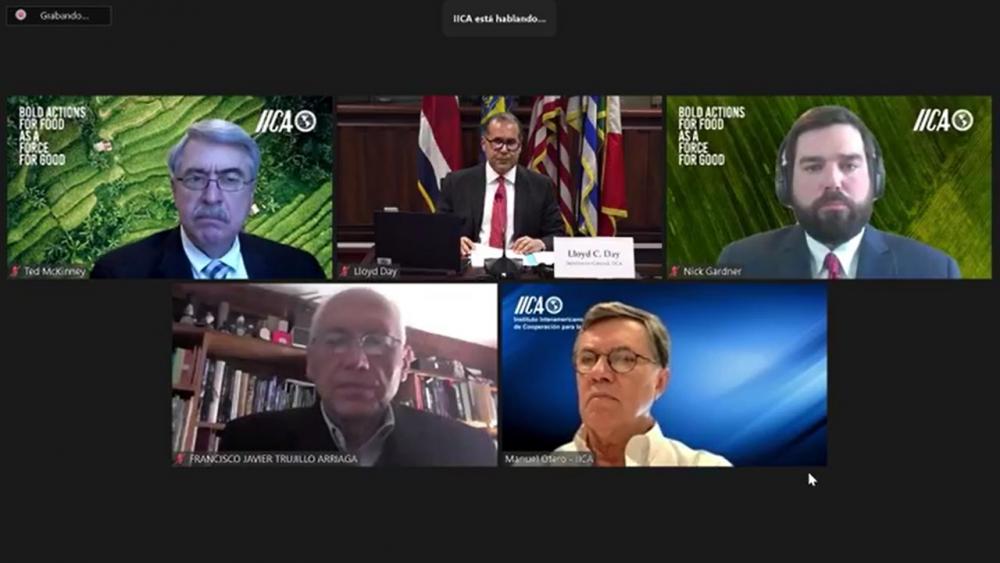Agricultural authorities from the United States, Mexico and Uruguay shared their views on the role of livestock production in a sustainable food systems

San Jose, 26 November 2020 (IICA). The livestock sector, animal production and animal protein are crucial to food systems because of their positive implications for nutrition, sustainability and rural development. This was one of the conclusions reached by agricultural authorities from the United States, Mexico and Uruguay during an event organized by the Inter-American Institute for Cooperation on Agriculture (IICA) and the World Economic Forum (WEF) in preparation for next year’s United Nations (UN) Food Systems Summit.
Participating in the event were Ted McKinney, Under Secretary of Agriculture for Trade and Foreign Agricultural Affairs at the United States Department of Agriculture (USDA); Francisco Trujillo, Under Secretary of Agriculture and Director of Mexico’s National Service for Agrifood Health, Safety and Quality (SENASICA); and Juan Ignacio Buffa, Under Secretary of Livestock, Agriculture and Fisheries of Uruguay.
Nick Gardner, Vice President of the U.S. Dairy Export Council (USDEC), and Manuel Otero, Director General of IICA, also formed part of the panel of experts.
During the event, which followed up on two forums organized by IICA, USDEC and the Global Dairy Platform (GDP) in August and October, the specialists agreed that livestock production and animal protein are crucial for agricultural systems and rurality, because of their contributions to food security, health and socioeconomic, cultural and environmental development.
“About 1.3 billion low-income people, 70% of whom are women, depend on livestock, dairy and poultry for their livelihoods”, stated McKinney.
As stated during the webinar, the livestock sector accounts for 46% of GDP in the Americas alone. Other positive benefits of the livestock industry are associated with poverty reduction and employment generation.
“A total of 240 million people are employed either directly or indirectly in the dairy sector. The hemisphere has a strong connection to livestock and the consumption of animal protein is at the core of its food system; a world without livestock would have significant negative repercussions on millions of rural communities”, remarked Gardner.
The Director General of IICA, in turn, stated that “we must guarantee food for the region, given that 25% of the calories and 15% of the proteins consumed by people in the region are of animal origin”.
“Livestock is a sector that must be defended, promoted, encouraged and improved in order to strengthen our agrifood systems”, he added.
Science and innovation
The speakers agreed that science must serve as the foundation for decision making, the development of regulations, efforts to support the safety and health of consumers, and the provision of accurate information on the role of livestock production and animal protein in nutrition, especially considering that arguments against the consumption of animal protein often lack a scientific basis.
“Science breaks down unfounded beliefs and myths”, remarked Buffa, Under Secretary of Livestock, Agriculture and Fisheries of Uruguay, who highlighted his country’s experience with information, traceability, and health and safety systems, which are crucial for livestock production and even more so in the current context of the pandemic.
“The challenge is to produce whole foods, to conduct work based on science, to leave no one behind, and to maintain a social fabric. To this end, digitalization is key because it narrows gaps”, he stated.
The specialists stressed that innovation and the use of biotechnology is the way forward to increase efficiency and productivity, as well as to advance towards a sector with sustainable production in all its dimensions, in order to guarantee safe and quality agrifood systems.
The specialists will advocate for biotechnology at the UN Food Systems Summit, during which IICA will seek to lend a voice to the agriculture sector and shine the spotlight on producers and livestock farmers, who make valuable contributions to food security.
“Innovation is the answer and sustainability is our guide. Let us not look back to my great-grandfather’s time. Let us move forward to innovate appropriately and bring solutions to everyone in the world, not mandatory bans and traditional colonialism; that is not the way forward for global agriculture”, indicated Ted McKinney, Under Secretary of Agriculture for Trade and Foreign Agricultural Affairs at the USDA.
“There is a great deal of commitment to balance all factors, focusing not only competition, competitiveness and commercial success, but also on our responsibility towards the environment and society, betting on greater collaboration among all participants in food systems”, stated Mexico’s Undersecretary of Agriculture, Trujillo.
The head of the agency specializing in agriculture and rural life concluded his remarks by explaining that “IICA is very excited about this Summit and the opportunity to highlight the very important contributions of the Americas to feeding the world through sustainable and safe agricultural production, as well as ensuring that producers and farmers are at the forefront, and that agriculture is part of the solution, not the problem, in meeting the challenges of climate change”.
Main points of consensus during the discussion:
-
Livestock production is and will continue to be an important part of the food system.
-
Animal protein producers are advancing towards more sustainable and responsible food production, although there is still work to be done.
-
Food systems must work for everyone and high-quality diets must be available to all.
-
Eliminating livestock production from food systems would significantly limit economic opportunities and the development potential of rural communities.
-
Animal protein producers are grateful for the advances that improve our world; we must embrace technology, innovation and trade.
Actions moving forward:
-
Continue to promote science-based decision making.
-
Continue to promote innovation as a key to greater sustainability and productivity.
-
Continue to promote the key role of sustainable livestock production for nutrition, health and sustainable food systems.
More information:
Horrys Friaca, International Specialist of the IICA Agricultural Health and Food Safety (AHFS) Program.
horrys.friaca@iica.int